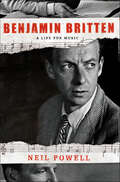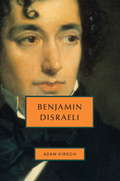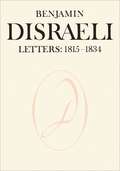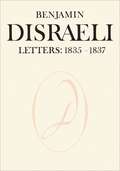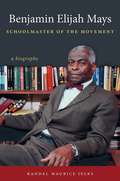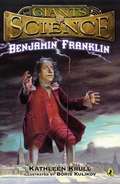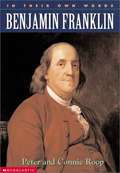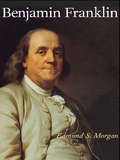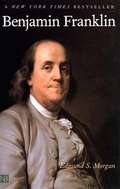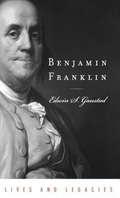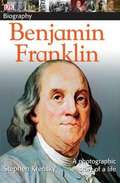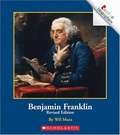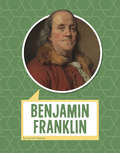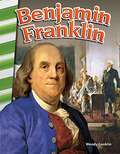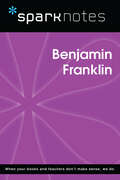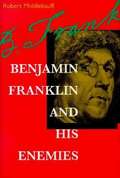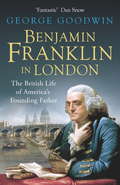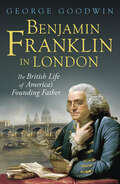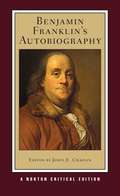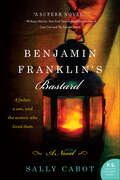- Table View
- List View
Benjamin Britten (Penguin Specials)
by Igor Toronyi-LalicBenjamin Britten was one of the most important and unusual figures in twentieth-century music. This is the perfect introduction to his many wonderful works and his fascinating, controversial life.Benjamin Britten single-handedly transformed the reputation of British classical music. The enormous popular appeal of his great works, such as Peter Grimes (1945) and the Young Person's Guide to the Orchestra (1946), make him the most successful opera composer of any born in the twentieth century. But his success was not without controversy and pain: he was accused of fleeing Britain to avoid military service, he was widely known to be sexually obsessed with boys and he suffered an astonishing array of illnesses. This short book combines a colourful overview of his life with pithy descriptions of all of his major musical works, providing an intimate portrait of this highly unusual man and a persuasive account of his influences, reputation and importance.Each chapter tackles a key episode and theme in his life, from his first compositions at the age of 5, his early friendship and collaboration with W H Auden and the beginnings of his life-long relationship with the tenor Peter Pears, through to his great musical successes and the establishment of the influential, if tempestuous, Aldeburgh Festival, as well as his failures, such as his coronation opera Gloriana (known as 'Boriana') and being satirised by Dudley Moore in Beyond the Fringe - and ending with frank discussions of his naïve politics, his troubling sexuality and his glorious musical legacy.Published to coincide with his 100th anniversary of his birth, this is the perfect introduction to a towering figure of British culture.Igor Toronyi-Lalic is a critic and curator. He writes regularly on music for, among others, The Times and Sunday Telegraph. He is a founder of theartsdesk.com, the author of What's That Thing? (2012), a report on public art, and co-director of the London Contemporary Music Festival.
Benjamin Britten: A Life for Music
by Neil PowellThis spellbinding centenary biography by Neil Powell looks at the music, the life, and the legacy of the greatest British composer of the twentieth centuryBenjamin Britten was born on November 22, 1913, in the East Suffolk town of Lowestoft. Displaying a passion and proficiency for music at an early age, to the delight of his mother, Edith, a talented amateur musician herself, he began composing music when he was only five years old. After studying at the Royal College of Music, Britten went on to write documentary scores for the General Post Office Film Unit, where he met and collaborated with the poet W. H. Auden.Of more lasting importance was Britten's introduction in 1937 to the tenor Peter Pears, who was to become the inspirational center of his emotional and musical life. Their partnership lasted nearly four decades, during a dangerous time when homosexuality was illegal in England. Conscientious objectors, Britten and Pears followed Auden to America before the war began in 1939. While there, they joined the extraordinary Brooklyn ménage of George Davis, Louis MacNeice, and Paul Bowles.Eventually intense homesickness, provoked in part by George Crabbe's poem "Peter Grimes," drove the pair home to East Anglia in 1942 and gave Britten the inspiration for his finest opera. Throughout his career, Britten did not want modern music to be just for "the cultured few" and instead always composed his music to be "listenable-to." The shared quotidian lives of Britten and Pears unfold in this intimate biography and the story of two men who created a truly remarkable legacy.
Benjamin Disraeli
by Adam KirschNew York-based poet and critic Kirsch presents a biography of British novelist and politician Disraeli (1804-81) emphasizing his support for what would become Zionism and the impact of his prominence on the portrayal of Jews in Britain. No index or bibliography is provided.
Benjamin Disraeli Letters
by Ellen L. Hawman Michael W. Pharand M. G. Wiebe Mary S. Millar Sandra Den OtterIn February 1868 Benjamin Disraeli became the fortieth prime minister of Great Britain. The tenth volume of the Benjamin Disraeli Letters series is devoted exclusively to Disraeli's copious correspondence during that momentous year. The volume contains 648 of Disraeli's letters, 510 of them never before published and all copiously annotated - often with the other side of the correspondence included.This volume constitutes a unique record of Disraeli's rise to power and of the inner workings of the Victorian political scene, all of it recorded in intimate detail. A vast project which the Times Literary Supplement has called "a monument to scholarship," the Benjamin Disraeli Letters volumes are an essential resource for the study of nineteenth-century politics, history, literature, and the arts.
Benjamin Disraeli Letters, 1865-1867 #9
by Ellen L. Hawman Michael W. Pharand M. G. Wiebe Mary S. Millar Sandra Den OtterThe Times Literary Supplement recently praised the Benjamin Disraeli Letters volumes as 'a remarkable series ... on its way to becoming one of the landmarks of Victorian-era scholarship.' Each volume provides a unique record of Disraeli's daily activities as well as rare glimpses into his decision-making process and his relationships with colleagues and political foes.This latest volume covers 1865 to 1867, crucial years leading up to Disraeli's first ministry in 1868. During this period, the prime minister, Lord Derby, and Disraeli, chancellor of the exchequer, grappled with a number of challenges. Their greatest accomplishment, however, was the passage of a landmark franchise reform bill that expanded the electorate in England to an unprecedented extent.The story is told through 697 letters, of which 525 have never before been published and 78 only in part. Thoroughly annotated, the notes often include the other side of Disraeli's correspondence - including many letters from Derby and Queen Victoria. Finally, this volume is cross-referenced with the previous ones to obtain as complete a picture as possible of political events during Disraeli's lifetime.
Benjamin Disraeli Letters: 1815-1834, Volume I
by John Matthews Benjamin Disraeli John Gunn Donald Schurman Melvin WiebeThe private letters of a statesman are always inviting material for historians and when he has claim to literary fame as well the correspondence assumes a double significance. Benjamin Disraeli (1804-1881) belonged to an age that gave pride of place to the written word as an instrument of both business and pleasure. This volume includes 363 letters (many previously unpublished) from his school boy days to his establishment in the Tory camp under the patronage of Lord Lyndhurst. Most prominent are Disraeli's letters to his sister, Sarah, with whom he corresponded frequently over several decades. To her he confided his hopes, interspersed with his observations and descriptions of social, literary and political events. The letters to Sarah supply a skeleton around which Disraeli's young manhood can be reconstructed and shed valuable light on the remaining documents in the volume. The correspondence also includes accounts of his tour of the Low Countries and the Rhine in 1824, his adventurous trip to Spain, Greece, the Near East and Egypt in 1830, his tense negotiations with publishers and his campaign to shine as a member of aristocratic society and win political patronage. The letters demonstrate the fine eye for detail and the capacity for self-dramatization and literary conceits which mark his novels. With their annotations they also provide a remarkably detailed account of life in the upper reaches of English society as viewed from below, and of Disraeli's ambitions to enter that life.
Benjamin Disraeli Letters: 1835-1837, Volume II
by John Matthews Benjamin Disraeli John Gunn Donald Schurman Melvin WiebeThe 334 letters in this volume cover the period from Disraeli's establishment in the Tory camp under the patronage of Lord Lyndhurst to his election to parliament in 1837. The most important issue to which they speak is the course of Disraeli's political ambitions. In 1835 the road to parliament was not yet clear, for he continued to be haunted by troubles from his past. He was beset by charges of opportunism in his Taunton campaign of 1835, and the longest letters here are those to Edwards Beadon written in justification of past conduct; Disraeli had still to learn the truth of his later dictum, 'never explain.' Also, debts contracted many years before continued to plague him, as they would in years to come. He was tempted by a variety of money-making schemes and the later correspondence makes clear just how close he came to permanent ruin at the hands of his creditors in the spring of 1837. Had the fate of debtors' prison materialized it is doubtful that he would ever have been eligible, in law or in reputation, for a parliamentary career. Disraeli's eventual election for Maidstone in the summer of 1837 marked the emergence of his formal public role. Because he set out early and was a long time in attaining his goals, one is tempted to laud his patience. But the record here suggests that it was instead a matter of energy and endurance. This volume of the Letters brings Disraeli to the threshold of the Victorian era and the beginning of his career as a politician. In late 1837 he failed in his maiden speech, but all major successes lay ahead.
Benjamin Elijah Mays, Schoolmaster of the Movement
by Randal Maurice JelksIn this first full-length biography of Benjamin Mays (1894-1984), Randal Maurice Jelks chronicles the life of the man Martin Luther King Jr. called his "spiritual and intellectual father." Dean of the Howard University School of Religion, president of Morehouse College, and mentor to influential black leaders, Mays had a profound impact on the education of the leadership of the black church and of a generation of activists, policymakers, and educators. Jelks argues that Mays's ability to connect the message of Christianity with the responsibility to challenge injustice prepared the black church for its pivotal role in the civil rights movement. From Mays's humble origins in Epworth, South Carolina, through his doctoral education, his work with institutions such as the National Urban League, the NAACP, and the national YMCA movement, and his significant career in academia, Jelks creates a rich portrait of the man, the teacher, and the scholar. Benjamin Elijah Mays, Schoolmaster of the Movement is a powerful portrayal of one man's faith, thought, and mentorship in bringing American apartheid to an end.
Benjamin Franklin
by Balu SathyaThis Tamil book gives, in a nutshell, a biography of Benjamin Franklin, one of the Founding Fathers of the United States of America. A leading author and printer, political theorist, politician, postmaster, scientist, inventor, satirist, civic activist, statesman, and diplomat, this biography of multifaceted Benjamin Franklin will influence young generation to emulate.
Benjamin Franklin
by Kathleen Krull Boris KulikovSure, almost all kids know Benjamin Franklin as one of America's Founding Fathers, a man with a hand in both the Declaration of Independence and the U.S. Constitution. And they may even have some vague idea that he once flew a kite during a lightning storm. What Kathleen Krull sets out to do in this very different biography is show Ben Franklin the "natural philosopher" (the term for scientists back in the 1700s), whose experiments led to important discoveries about the nature of electricity--including his famous demonstration that electricity and lightning were one and the same. As always, this much-lauded series presents a true Giant of Science in a juicily anecdotal way. This is social history at its best. . . . who knew that Franklin became such a megastar that Paris shops sold Ben dolls, Ben ashtrays, even Ben wallpaper? Witty and engaging, this is a worthy addition to the Giants of Science series.
Benjamin Franklin
by Peter Roop Connie RoopThe story of America's first well-known jack-of-all-trades--printer, scientist, inventor, and statesman Benjamin Franklin--is told here in his own words, through his newspaper articles and personal recollections.
Benjamin Franklin
by Edmund S. MorganChosen as a Notable Book of the Year by the New York Times Book Review and as a best book for 2002 by the Los Angeles Times Book Review, Washington Post Book World, and Publishers Weekly. A finalist for the 2003 National Book Critics Circle Award in biography. The greatest statesman of his age, Benjamin Franklin was also a pioneering scientist, a successful author, the first American postmaster general, a printer, a bon vivant. In addition, he was a man of vast contradictions. This bestselling biography by one of our greatest historians offers a compact and provocative new portrait of America's most extraordinary patriot.
Benjamin Franklin
by Edmund Sears MorganShort biography of Benjamin Franklin by a historian who has numerous books to his credit along with numerous awards.
Benjamin Franklin
by Edwin S. GaustadThe tenth and youngest son of a poor Boston soapmaker, Benjamin Franklin would rise to become, in Thomas Jefferson's words, "the greatest man and ornament of his age. " In this short, engaging biography, historian Edwin S. Gaustad offers a marvelous portrait of this towering colonial figure, illuminating Franklin's character and personality. Here is truly one of the most extraordinary lives imaginable, a man who, with only two years of formal education, became a printer, publisher,postmaster, philosopher, world-class scientist and inventor, statesman, musician, and abolitionist. Gaustad presents a chronological account of all these accomplishments, delightfully spiced with quotations from Franklin's own extensive writings. The book describes how the hardworking Franklin became at age 24 the most successful printer in Pennsylvania and how by 42, with the help of Poor Richard's Almanack, he had amassed enough wealth to retire from business. We then follow Franklin's nextbrilliant career, as an inventor and scientist, examining his pioneering work on electricity and his inventions of the Franklin Stove, the lightning rod, and bifocals, as well as his mapping of the Gulf Stream, a major contribution to navigation. Lastly, the book covers Franklin's role as America's leading statesman, ranging from his years in England before the Revolutionary War to his time in France thereafter, highlighting his many contributions to the cause of liberty. Along the way, Gaustad sheds light on Franklin's personal life, including his troubled relationship with his illegitimate son William, who remained a Loyalist during the Revolution, and Franklin's thoughts on such topics as religion and morality. Written by a leading authority on colonial America, this compact biography captures in a remarkably small space one of the most protean lives in our nation's history.
Benjamin Franklin
by Wil MaraA brief biography on the life of Benjamin Franklin and his lasting influence on America and Philadelphia. Includes index and Words You Know section that highlights terms and concepts from the text and illustrates them with photographs. Photographs are directly related to the text to encourage independent reading. Grades K-4
Benjamin Franklin (Biographies)
by Laura K. MurrayHow much do you know about Benjamin Franklin? Find out the facts you need to know about this Founding Father, author, and inventor. You'll learn about the early life, challenges, and major accomplishments of this important American.
Benjamin Franklin (Social Studies: Informational Text Ser.)
by Wendy ConklinFascinate your students with the life and times of Benjamin Franklin, the talented inventor, politician, and writer who contributed to the Declaration of Independence and Constitution. This enthralling nonfiction e-Book breathes life into America's early years with primary source documents. Primary sources offer an intimate glimpse of what life was like during Franklin's lifetime, from his early days as an apprentice to his many accomplishments. Build literacy and subject content knowledge with this high-interest e-Book that explores history and other social studies topics. The Benjamin Franklin reader contains text features such as captions, headings, glossary, and index to increase understanding and build academic vocabulary. Aligned to McREL, WIDA/TESOL, NCSS/C3 Framework and other state standards, this text readies students for college and career readiness.
Benjamin Franklin (SparkNotes Biography Guide)
by SparkNotesBenjamin Franklin (SparkNotes Biography Guide) Making the reading experience fun! SparkNotes Biography Guides examine the lives of historical luminaries, from Alexander the Great to Virginia Woolf. Each biography guide includes:An examination of the historical context in which the person lived A summary of the person&’s life and achievements A glossary of important terms, people, and events An in-depth look at the key epochs in the person&’s career Study questions and essay topics A review test Suggestions for further reading Whether you&’re a student of history or just a student cramming for a history exam, SparkNotes Biography guides are a reliable, thorough, and readable resource.
Benjamin Franklin and His Enemies
by Robert MiddlekauffMiddlekauff (history, UC-Berkeley) explores Franklin's darker side, his passionate anger and his adversarial relationships with the Penns, John Adams, and Arthur Lee, and his disappointment in his son's loyalty to Britain, weaving episodes in Franklin's life into colonial and Revolutionary history. Annotation c. by Book News, Inc., Portland, OR.
Benjamin Franklin and a Case of Christmas Murder
by Robert Lee Hall[from the back cover:] "London's most inventive sleuth since Sherlock Holmes! Tis the season to be jolly, to deck the halls with boughs of holly. But for prosperous London merchant Roderick Fairbrass, who's entertaining at his home on Christmas night, 'tis the season of despair... when he suddenly collapses and dies. And at least one of the guests, Benjamin Franklin, suspects there's more than meets the eye behind his genial host's sudden demise. Using his inventive powers of detection, Franklin sets out to discover the truth. Before he's done, he will not only confront the ghost that inhabits the Fairbrass house, but come face to face with some of London's most sinister scoundrels... and unravel a tangled plot of intrigue, extortion and scandal."
Benjamin Franklin in London: The British Life of America's Founding Father
by George Goodwin'Sensitive, moving and finely textured' Guardian'Fantastic' Dan SnowFor the great majority of his long life, Benjamin Franklin was a loyal British royalist. In 1757, having made his fortune in Philadelphia and established his fame as a renowned experimental scientist, he crossed the Atlantic to live as a gentleman in the heaving metropolis of London. With just a brief interlude, a house in Craven Street was to be his home until 1775. From there he mixed with both the brilliant and the powerful, whether in London coffee house clubs, at the Royal Society, or on his summer travels around the British Isles and continental Europe. He counted David Hume, Matthew Boulton, Joseph Priestley, Edmund Burke and Erasmus Darwin among his friends, and as an American colonial representative he had access to successive Prime Ministers and even the King.The early 1760s saw Britain's elevation to global superpower status with victory in the Seven Years War and the succession of the young, active George III. These two events brought a sharp new edge to political competition in London and redefined the relationship between Britain and its colonies. Though Franklin long sought to prevent the break with Great Britain, his own actions would finally help cause that very event. On the eve of the American War of Independence, Franklin fled arrest and escaped by sea. He would never return to London. With his unique focus on the fullness of Benjamin Franklin's life in London, George Goodwin has created an enthralling portrait of the man, the city and the age.
Benjamin Franklin in London: The British Life of America's Founding Father (The Lewis Walpole Series in Eighteenth-Century Culture and History)
by George GoodwinAn “enthralling” chronicle of the nearly two decades the statesman, scientist, inventor, and Founding Father spent in the British imperial capital (BBC Radio 4, Book of the Week).For more than a fifth of his life, Benjamin Franklin lived in London. He dined with prime ministers, members of parliament, even kings, as well as with Britain’s most esteemed intellectuals—including David Hume, Joseph Priestley, and Erasmus Darwin—and with more notorious individuals, such as Francis Dashwood and James Boswell. Having spent eighteen formative months in England as a young man, Franklin returned in 1757 as a colonial representative during the Seven Years’ War, and left abruptly just prior to the outbreak of America’s War of Independence, barely escaping his impending arrest.In this fascinating history, George Goodwin gives a colorful account of Franklin’s British years. The author offers a rich and revealing portrait of one of the most remarkable figures in U.S. history, effectively disputing the commonly held perception of Franklin as an outsider in British politics. It is an absorbing study of an American patriot who was a fiercely loyal British citizen for most of his life—until forces he had sought and failed to control finally made him a reluctant revolutionary at the age of sixty-nine.“[An] interesting, lively account of Franklin’s British life.” —The Wall Street Journal
Benjamin Franklin's Autobiography
by Benjamin Franklin Joyce E. ChaplinChaplin (early American history, Harvard U. ) presents an edition of Benjamin Franklin's Autobiography that includes an introduction that explains the history of the autobiography within the larger history of the genre and the history of celebrity, new and expanded explanatory annotations, three maps, a guide to people mentioned in the text, and illustrations. It also presents the recently identified "Wagon Letters"; a "contexts" section that includes his journal entries from a 1726 voyage, pieces of correspondence, excerpts from writings on ambition, fame, and wealth, his views on self-improvement, and his last will; and a criticism section containing both contemporary, nineteenth-century, and recent opinions on Franklin, from Immanuel Kant to Edgar Allan Poe to D. H. Lawrence. Annotation ©2012 Book News, Inc , Portland, OR (booknews.com)
Benjamin Franklin's Bastard: A Novel
by Sally CabotAn absorbing work of literary historical fiction that brings to life a little-known chapter of the American Revolution from the author of The Widow’s War.William Franklin, the son of Benjamin and his favorite mistress, Anne, is raised by Deborah, Benjamin’s wife. A steadfast loyalist, he and his father cannot reconcile their wildly disparate views, causing a rift in the bond both thought unbreakable.Fascinating and heartbreaking, Benjamin Franklin’s Bastard is a gripping tale of family, love, and war, set against one of America’s most fascinating periods of history.“This is a superb novel. Don’t miss it.” —William Martin, New York Times–bestselling author“Cabot laces her assured novel with Shakespearean overtones as the characters continually misconstrue one another’s motives. From Franklin’s intense intellectual curiosity to Anne’s stubborn insistence on leading an independent life, this memorable cast makes for spellbinding reading.” —Booklist“For all Franklin’s genius, fortune, and increasing stature, he is not spared the trials of women, concerns for children, or the struggles between a father and son with political differences . . . [Cabot is] a gifted writer.” —The Providence Journal“[A] poignant tale of love, survival, loyalty, and the meaning of family.” —RT Book Reviews“An enticing read for history buffs . . . genuinely heart-wrenching.” —Publishers Weekly

